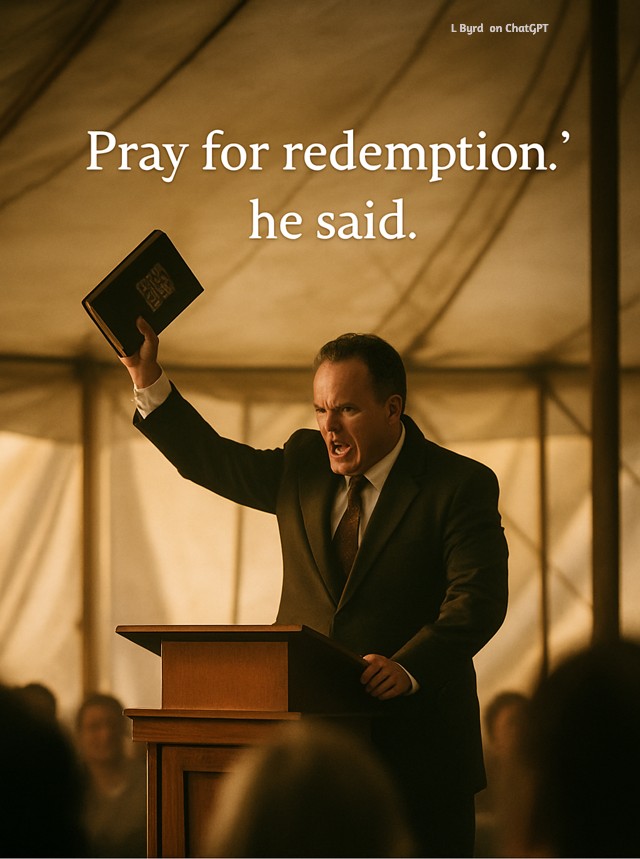When “I’m Sorry” Became My Identity
By the time I was 5 years old, the words I’m sorry had become my mantra; they lived in my mouth like breath. I constantly whispered them to myself, to others, and to the Divine. These words had become my identity.
My naive little 5-year-old self, already lost in the confusion and uncertainty of life, decided one day that she must be bad—so bad that God herself had turned away, rejecting her completely. She wasn’t sure why this had happened, what she had done to make God so angry with her. She just knew that somehow, she was bad.
The Day Fear Was Planted
It started on a warm, sunny afternoon when my grandmother took me with her to a tent revival meeting. I felt special, just grandma and me. I skipped alongside her as we approached the large white tent. We seated ourselves very near the front, where we could see almost everything.
There was a small stage and a podium where several men stood, milling about, watching the crowd that was gathering. One of the men finally stepped up to the podium and started speaking. He spoke loudly, repeatedly pounding his fist. He seemed angry, like I’d seen my father at times–his sweaty face red and distorted. He scared me, so I moved just a tad closer to Grandma.

The man at the pulpit said he spoke for God. He said God was very concerned about this person he called the devil. He told us to pray for redemption. He told us not to let the devil into our hearts. He told us he could save our pathetic souls.
I didn’t understand his words, but the fear was palpable. Squeezing my eyes tight, wanting to be somewhere, anywhere else, I desperately clung to my grandmother, secretly wishing we would leave.
Grandma marched me up to the front of the podium and presented me like a gift to the man who spoke for God. Glancing down briefly, he placed one large, sweaty palm on my head and held a bible in the other. He looked up, shaking both my head and the bible. Who was he speaking to, I wondered.
He yelled out loud, shaking that bible, “In God’s name, I command that you, Satan, leave this child!” The audience replied with “amen” and “thank you, Jesus.”
Then, just like that, it was over. Grandma ushered me back to my seat. Fear throttled me, squeezing my throat so tight I was sure I would throw up or pass out.
Back in my seat, nothing happened. Back home, nothing happened. I waited and waited, and nothing happened. I don’t know if that devil guy left me, but every time I did something wrong, one of the adults in my life would remind me that bad girls go to hell. Every night I’d say that prayer, “…and if I die before I wake, I pray God will take my Soul.” And I promised God that I’d be good and do whatever I could to get back into her grace.
For way too many years, I clung to the story that God had abandoned me. I prayed at night for redemption, saying over and over through my tears, “I’m sorry, please forgive me!”
The Lingering Message: You Are Not Enough
Every night I’d say that prayer, “…and if I die before I wake, I pray God will take my soul.” And I promised God I’d be good and do whatever I could to get back into her grace.
For way too many years, I clung to the story that God had abandoned me. I prayed at night for redemption, saying over and over through my tears, “I’m sorry, please forgive me!”
The Turning Point
There’s a quiet teaching from the Tao Te Ching that has lingered with me like a soft breath: “Deal with the small before it becomes large. Prevent trouble before it arises.”

One day at work, after a mistake I couldn’t undo, I apologized again—reflexively. A kind coworker gently stopped me. “You don’t have to keep saying you’re sorry,” she said. “It’s a negative word. You’re more than your mistakes.”
That moment stuck with me. But it wasn’t until much later, when I found the practice of Ho‘oponopono, that I began to understand.
These four phrases seemed simple:
I’m sorry. Please forgive me. Thank you. I love you.
Everyone who practiced the Ho’oponopono meditation reveled in the emotional release they felt. However, for me, it was confusing. Who was I appologizing to? Why, if sorry was a negative word, would I want to repeat it, even in a prayerful, meditative way. Just saying, I’m sorry, stung.
All I wanted was to free myself from the relentless, condemning programming that was keeping me in a state of constant fear.
A New Understanding
What I didn’t yet understand is that Ho‘oponopono is not about blame.
It’s about responsibility—not for what happened, but for how we hold it now.
It’s about clearing the residue, not reliving the story.
A Gentle Practice
If you feel called, I invite you to try this short, heart-centered meditation.
You don’t need to believe in anything. Just show up. Breathe. Be honest. That’s enough.
Ho‘oponopono Meditation

Create a quiet space. Light a candle or sit near a window. Place one hand over your heart and one on your belly.
Close your eyes.
Breathe in through your nose…
Out through your mouth…
Three times.
Let your awareness settle into your heart.
Now, begin to speak—either silently or aloud:
I’m sorry.
For the ways I have forgotten who I truly am.
For the places I have turned away from love.
Please forgive me.
For carrying pain that was never mine.
For the stories I’ve believed about separation.
Thank you.
For this breath.
For this moment.
For the grace that is already moving through me.
I love you.
I love the parts of me I’ve hidden.
I love the people I do not yet understand.
I love the light within all beings.
Repeat as many times as you feel called.
When you feel complete, rest your hands on your heart and whisper:
It is done.
I release.
I return to peace.
A Final Whisper
Let this be a new kind of prayer.
Not one born of shame, but of softness.
Not to beg for grace, but to remember you already are it.
You don’t have to earn your way home.
You’re already on sacred ground.

